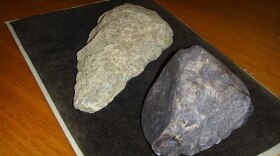-
The Best of Our Knowledge explores topics on learning, education, and research.Scientists believe that radiation from an exploding black hole could be detected on Earth in the next decade.And pumas are re-establishing themselves in Argentina’s Patagonia region. And they’ve found a new source of food.
-
The Best of Our Knowledge explores topics on learning, education, and research.Scientists believe that radiation from an exploding black hole could be detected on Earth in the next decade.And pumas are re-establishing themselves in Argentina’s Patagonia region. And they’ve found a new source of food.
-
The Best of Our Knowledge explores topics on learning, education, and research.The culture and traditions of Ancient Egypt have long captivated history students. But one part its history may have been swept under the rug.On today’s program, we’ll explore opium use in Ancient Egypt, and how the drug was used by people of all classes, including the pharaohs.
-
The Best of Our Knowledge explores topics on learning, education, and research.A common lizard in the American west plays a unique game of rock, paper, scissors.And your dog may be smarter than you think. A new study finds some dogs can learn by eavesdropping.
-
The Best of Our Knowledge explores topics on learning, education, and research.Scientists have discovered a distant planet that resembles a lemon.And while studying a mysterious cloud of hot dust 70 light-years away, researchers have found an unusual star.
-
The Best of Our Knowledge explores topics on learning, education, and research.On this episode, we’ll speak with a scientist who helped pinpoint a unique – and long theorized – form of matter.And we’ll visit museum in upstate New York that organizers hope will inspire the next generation of firefighters.
-
The Best of Our Knowledge explores topics on learning, education, and research.This week we’ll celebrate the best of The Best of Our Knowledge in 2025.We’ll learn about a new color that humans normally can’t see, a project that created one of the most advanced maps of the brain, and research that uncovers truths to the extinction of the dinosaurs.
-
The Best of Our Knowledge explores topics on learning, education, and research.On this episode, we’ll learn how an endangered antelope was born to a mother of a separate species.A new report from New York examines declining public-school enrollment.And lawmakers are celebrating the return of whole milk to the cafeteria.
-
The Best of Our Knowledge explores topics on learning, education and research.The Rapa Nui peoples of Easter Island have sculpted statues known as Moai for centuries.These statues are likely familiar to you – giant stone heads with prominent figurative facial features.We will learn all about how the Moai statues were transported by the Rapa Nui on the island to their places of display.
-
The Best of Our Knowledge explores topics on learning, education and research.The East African Savannah is known to be the cradle of humanity.Now, researchers are presenting a different history of homo sapiens, theorizing they evolved all across the continent including in rainforests as early as 150,000 years ago.[rerun]
-
The Best of Our Knowledge explores topics on learning, education, and research.Imagine seeing something brighter than 10 trillion suns… seems impossible.Well, scientists have detected a black hole flare that achieved this rare unbelievable brightness.This sighting opens up the possibility of there being more flares of this magnitude.We will learn all about this supermassive black hole flare.
-
The Best of Our Knowledge explores topics on learning, education, and research.Can you imagine early humans over 2 million years ago using tools, maybe not, but guess what they did!Technology has been a major part in our evolution as humans and stone tools were some of the beginnings of what we recognize as modern technology.We will explore a discovery of stone tools found in Kenya’s Turkana Basin to learn more about early technology and humans.















